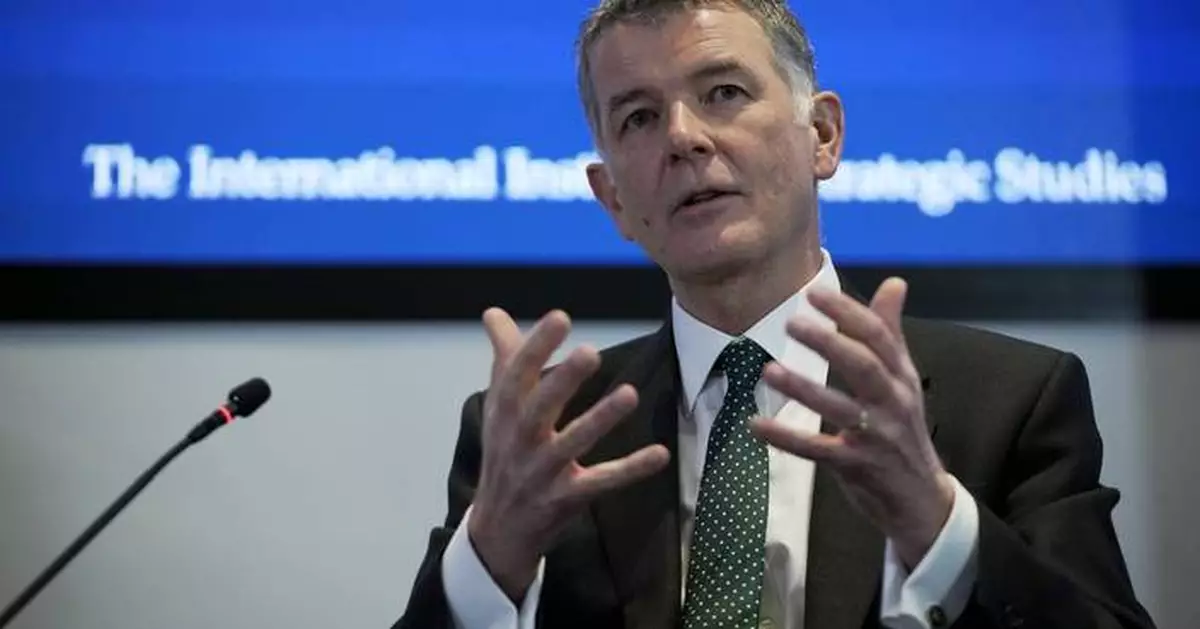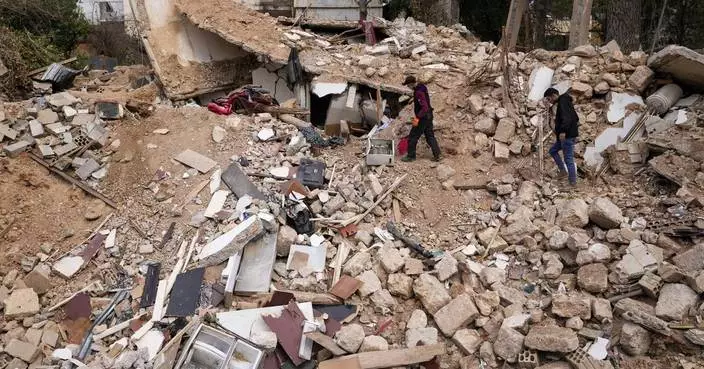PARIS (AP) — The head of Britain’s foreign intelligence service said Friday that Russia is conducting a “staggeringly reckless” sabotage campaign against Ukraine's Western allies, and that his spies are working to stop the consequences from spiraling out of control.
And in a message aimed in part at U.S. President-Elect Donald Trump, MI6 chief Richard Moore said that Russian victory in Ukraine would threaten American, as well as European, security.
Moore said his agency and its French counterpart were working together to a dangerous escalation by “calibrating the risk and informing the decisions of our respective governments” in response to President Vladimir Putin’s “mix of bluster and aggression.”
“We have recently uncovered a staggeringly reckless campaign of Russian sabotage in Europe, even as Putin and his acolytes resort to nuclear saber-rattling, to sow fear about the consequences of aiding Ukraine,” Moore said during a speech to diplomats and intelligence officials in France.
“Such activity and rhetoric is dangerous and beyond irresponsible,” he said.
Moore spoke alongside Nicolas Lerner, head of France’s external intelligence agency, the DGSE at an event marking 120 years of the Entente Cordiale, a pact between Britain and France that bound the age-old rivals together as military and diplomatic allies.
Western security officials suspect that Russian intelligence is trying to destabilize Ukraine’s allies through disinformation, sabotage and arson.
Moscow has been linked by Western officials to several planned attacks in Europe, including an alleged plot to burn down Ukrainian-owned businesses in London, and to incendiary devices in packages on cargo planes. In July one caught fire at a courier hub in Germany and another ignited in a warehouse in England.
Lerner agreed that “the collective security of the whole of Europe is at stake” in Ukraine. He said Britain’s experience tackling Russia in the wake of recent attacks like the 2018 Salisbury Novichok poisoning of a former Russian spy, was invaluable to French intelligence seeking to defuse Russian actions.
Britain and France have been among Ukrainian allies most willing to allow Kyiv to use weapons they supply – especially missiles known as Scalp in France and Storm Shadow in Britain – to hit targets inside Russia. The Biden administration recently eased its long-held opposition to U.S.-made missiles being used to strike Russia. Ukraine said last week it had used the American ATACM missiles to target Russia for the first time in the war.
Since then, Putin has lowered the official threshold for Russia’s use of its nuclear weapons, and Russia has pounded Ukraine’s energy infrastructure with hundreds of missiles and drones, in what Putin said was a response to the firing of the American missiles against Russian soil. Russia also fired a new intermediate-range ballistic missile, called Oreshnik, and Putin threatened to use it against “decision-making centers” in Kyiv, the Ukrainian capital.
In a warning to allies wavering in support for Ukraine, Moore said that “the cost of supporting Ukraine is well-known, but the cost of not doing so would be infinitely higher.”
Trump has criticized the billions the Biden administration has spent in supporting Ukraine and has said he could end the war in 24 hours — comments that appear to suggest he would press Ukraine to surrender territory that Russia now occupies.
“If Putin is allowed to succeed in reducing Ukraine to a vassal state, he will not stop there," Moore said. "Our security — British, French, European and trans-Atlantic — will be jeopardized.”
He said that if Russia wins, Iran and China — which so far support Moscow as “a transaction" — would draw closer to Russia.
“If Putin succeeds, China would weigh the implications, North Korea would be emboldened and Iran would become yet more dangerous,” Moore said.
Some European officials worry about what Trump's “America first” agenda means for trans-Atlantic relations, but Moore — whose name has been mentioned as a possible choice for U.K. ambassador to Washington — said he was confident the bond was strong.
“For decades the U.S.-U.K. intelligence alliance has made our societies safer,” he said. “I worked successfully with the first Trump administration to advance our shared security and look forward to doing so again.”

This photo provided by British Embassy Paris, Richard Moore, the Chief of Britain's Secret Intelligence Service, also known as MI6, speaks at the British Embassy in Paris on Friday, Nov. 29, 2024. (British Embassy Paris via AP)
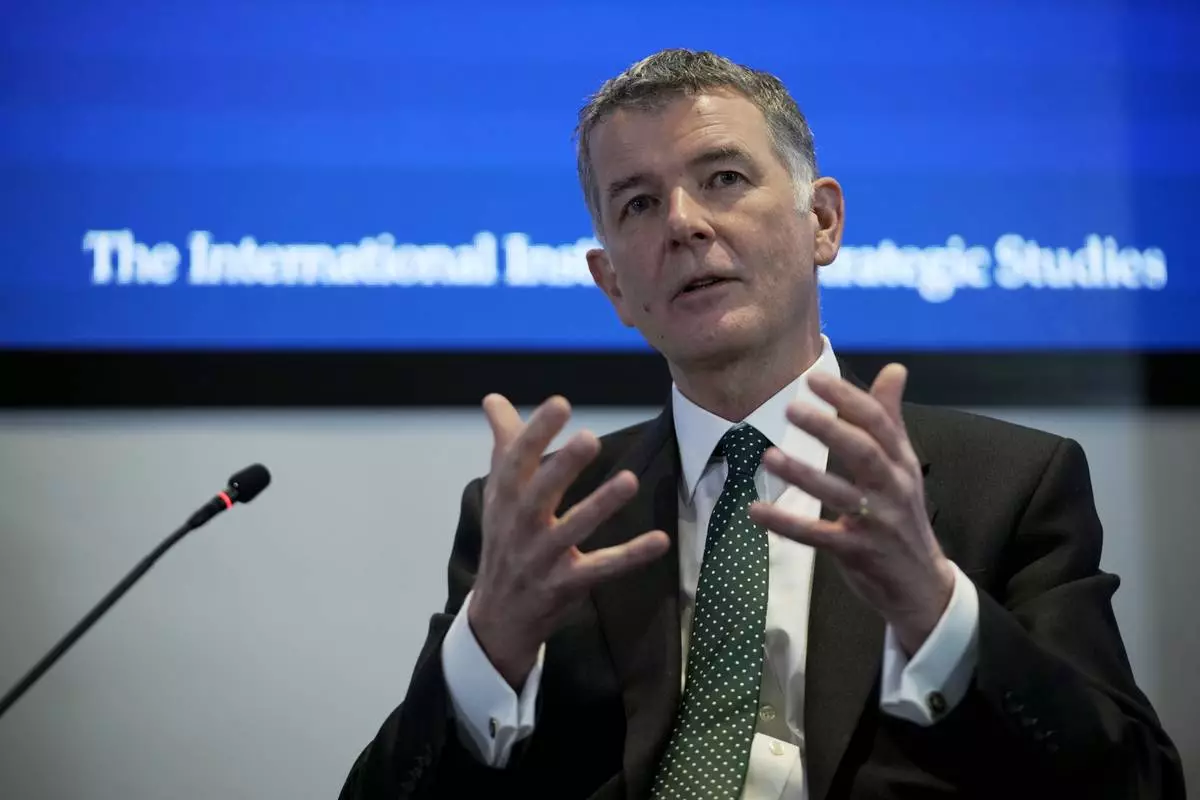
FILE - Richard Moore, the Chief of Britain's Secret Intelligence Service, also known as MI6, answers questions at the International Institute for Strategic Studies, in London, on Nov. 30, 2021. (AP Photo/Matt Dunham, File)
On a bright winter day, workers at a Ukrainian thermal power plant repair its heavily damaged equipment as drops of water from melted snow leak through gaping holes in its battered roof.
Several weeks earlier, the facility was targeted by a Russian air attack that left scorch marks, shrapnel scars on the walls, and missile fragments scattered across the production floor.
“This is our life now. Workers at a thermal power plant that’s supposed to produce electricity are walking on frozen floors and using firewood to keep warm,” Oleksandr, 52, head of the Production Management Department, told The Associated Press. He spoke on condition that only his first name be used citing security concerns.
Repeated Russian strikes on infrastructure have seriously impacted Ukraine's energy sector often resulting in rolling blackouts across the country. On Thursday, Moscow launched another large-scale air attack. Ukrainian authorities said nearly 200 drones and missiles targeted infrastructure, d isrupting power supply to more than a million people.
The scale of the ongoing work to fix the sector is huge. Since the start of Russia’s full-scale invasion in 2022, th e G7 and other allied countries have allocated more than $4 billion in energy assistance to Ukraine, U.S. Secretary of State Antony Blinken said in September.
Oleksandr, who works at the power plant operated by Ukraine’s largest private energy company, DTEK, says since the station was first attacked in November 2022, it has been unable to return to full capacity due to continuous strikes that have left critical equipment in ruins. The exact location of the plant visited by the AP, details on the damage and even workers’ last names cannot be disclosed for fear this information could help Russia coordinate future attacks.
DTEK operated around 20% of Ukraine’s electricity production before the full-scale invasion, but this figure dropped to 12% since the war broke out. The company says its facilities have been attacked by Russia almost 200 times since 2022. They also say nearly 90% of the company’s infrastructure was destroyed or suffered damage and that was before Russia launched its large-scale attack on Nov 17.
Oleksandr says he expects repairs at the station to continue through the winter into next year, and potentially far beyond. Repair efforts at the plant are further complicated by the fact that some critical equipment was manufactured in the Soviet Union and finding parts is now difficult. To mitigate this, some former Soviet countries who are now Ukraine’s allies have helped supply equipment.
“Potentially, Western countries could also help us with equipment, but their power grids have different characteristics,” Oleksandr said.
Only half of DTEK’s generating capacities have been restored since the first attacks on its plants in November 2022 until the latest large-scale strike. Earlier this week, the European Commission and the U.S. government a nnounced a donation of $112 million in equipment and construction materials to help DTEK prepare for the winter.
With the war in its third year, staff at DTEK’s plant have adapted to the grim reality of their day-to-day existence. They know the protocols by heart. Not everyone can take shelter during an air alert. A minimal crew must remain in the control room to oversee operations, putting themselves at risk of a direct strike.
“You have to sit and wait while monitoring the trajectories of whatever was fired, but the power units keep working so we cannot just leave, we stay in the control room,” said Dmytro, 41, a power unit operator at the plant.
Despite the challenges, Dmytro and his colleagues press on, driven by a mission to keep the lights on in their town and region over the winter months.
“Who’ll do it, if not us? I also have family waiting for me at home, but if we all leave and the equipment breaks down, the responsibility will be on our shoulders, the entire city will lose electricity and heating,” he said.
“Some are risking (their lives) at the frontline, while we here have our own energy front.”
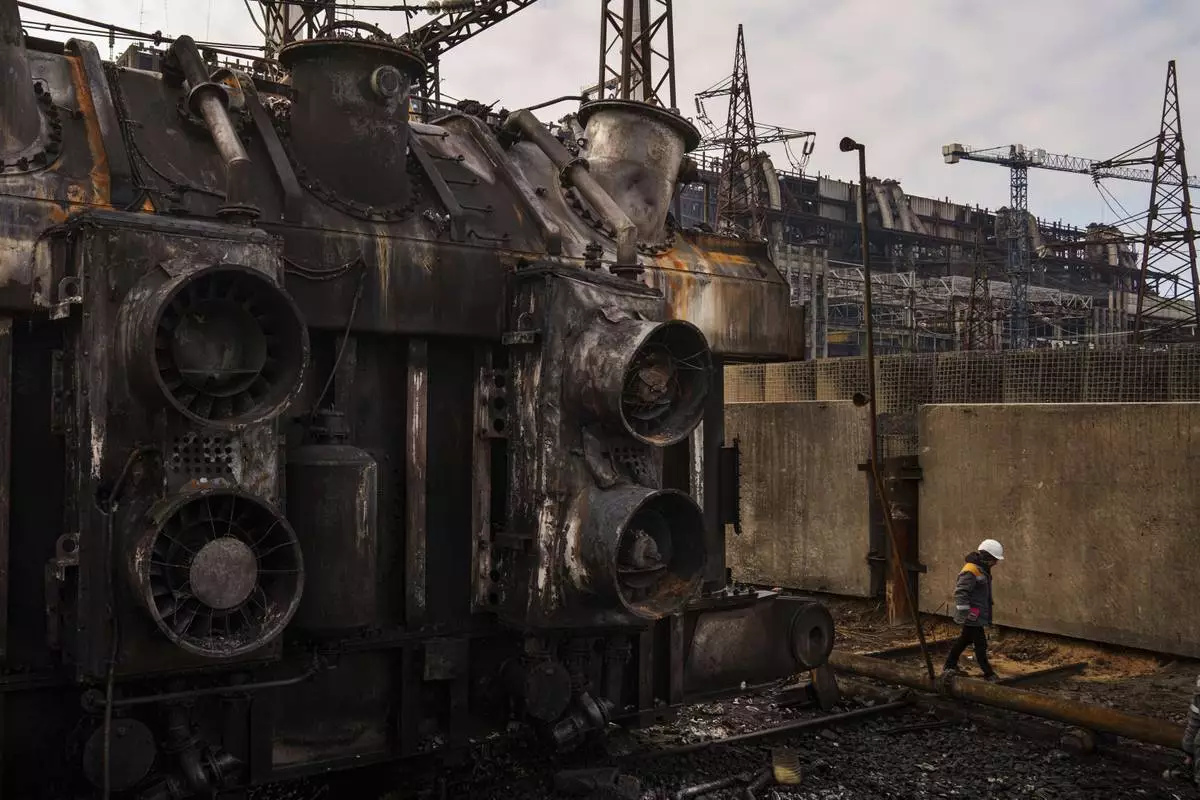
A worker walks in front of a transformer which was destroyed after a recent Russian missile attack at DTEK's power plant in Ukraine, Nov. 28, 2024. (AP Photo/Evgeniy Maloletka)
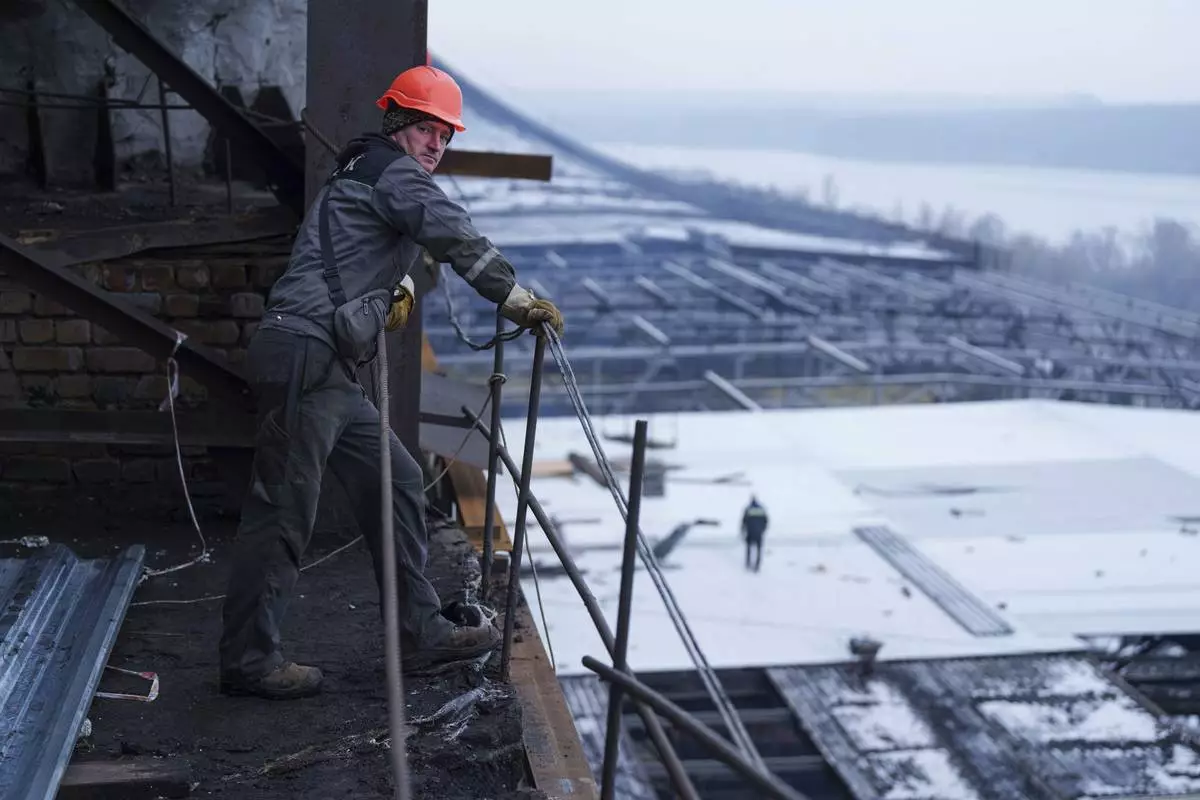
A worker stands on a roof of a DTEK's power plant after a recent Russian missile attack in Ukraine, Nov. 28, 2024. (AP Photo/Evgeniy Maloletka)
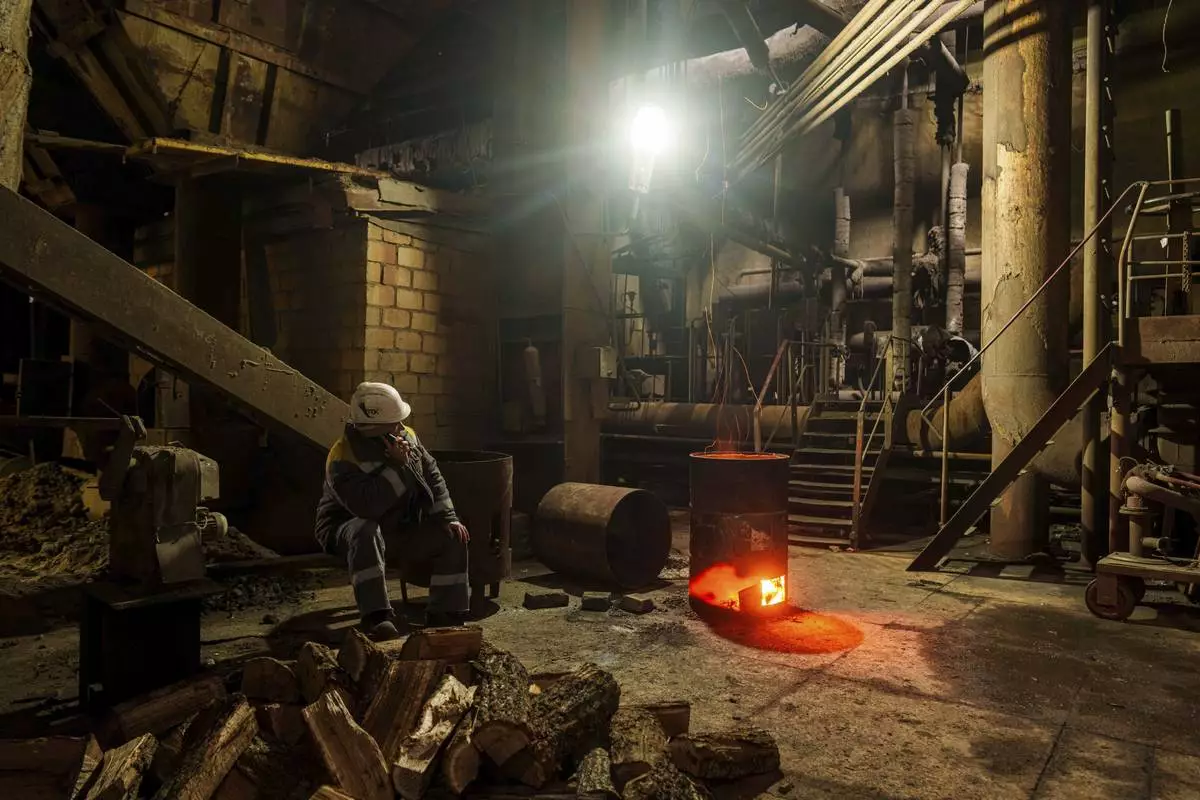
A worker speaks by mobile phone at DTEK's power plant after a recent Russian missile attack in Ukraine, Nov. 28, 2024. (AP Photo/Evgeniy Maloletka)
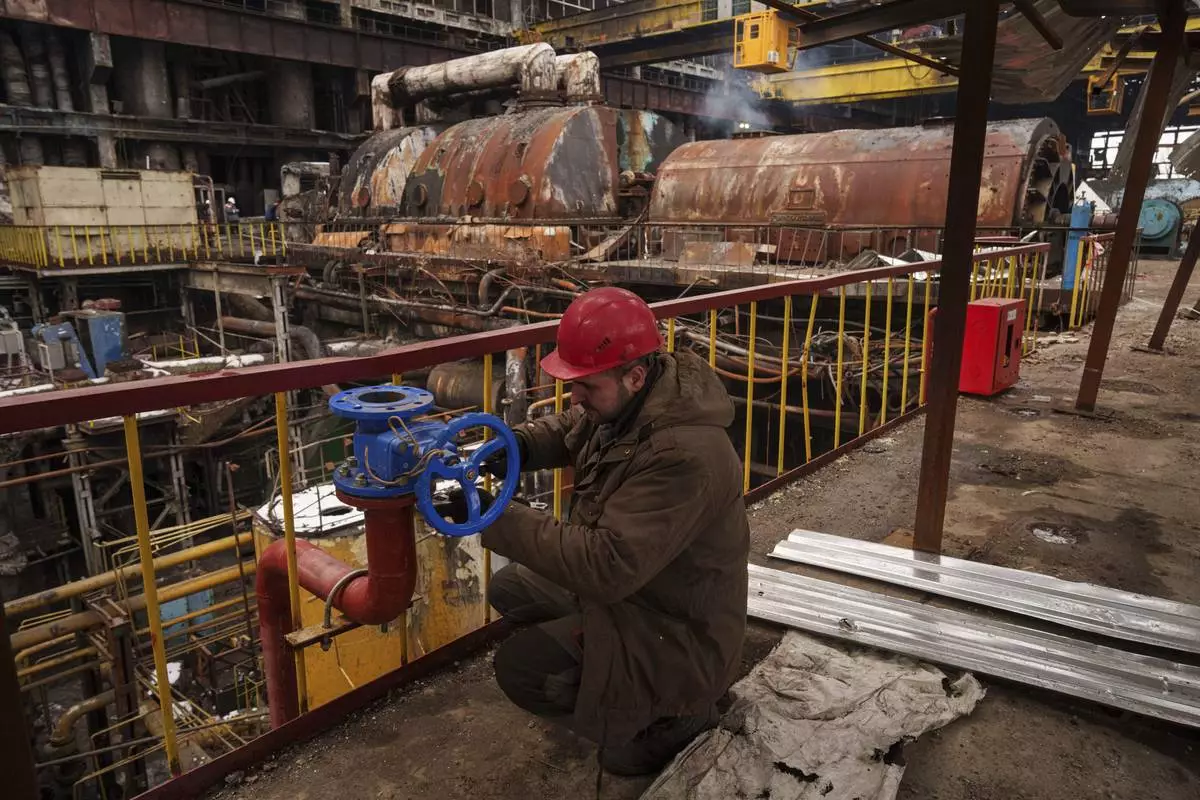
A worker repairs equipment at DTEK's power plant after a recent Russian missile attack in Ukraine, Nov. 28, 2024. (AP Photo/Evgeniy Maloletka)
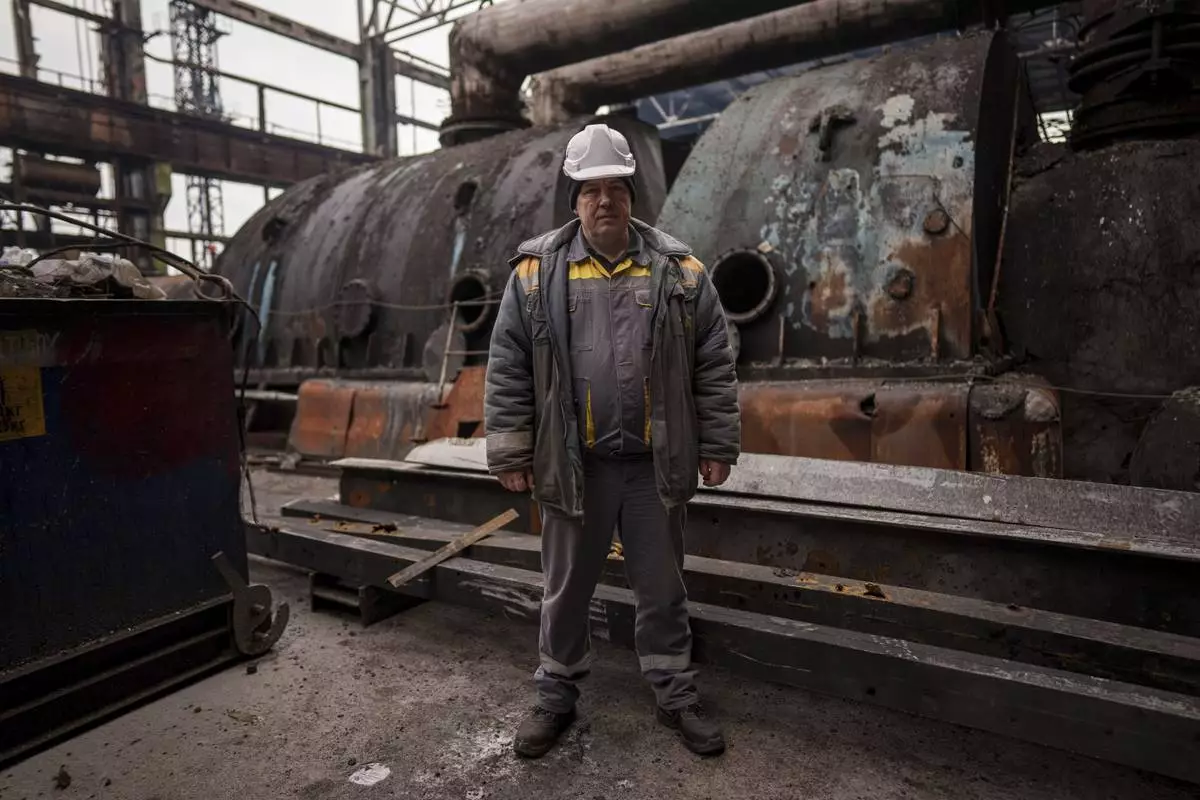
Oleksandr, 52, head of the Production Management Department stands in front of destroyed turbine at DTEK's power plant after a recent Russian missile attack in Ukraine, Nov. 28, 2024. (AP Photo/Evgeniy Maloletka)

Worker repair equipment at DTEK's power plant after a recent Russian missile attack in Ukraine, Nov. 28, 2024. (AP Photo/Evgeniy Maloletka)
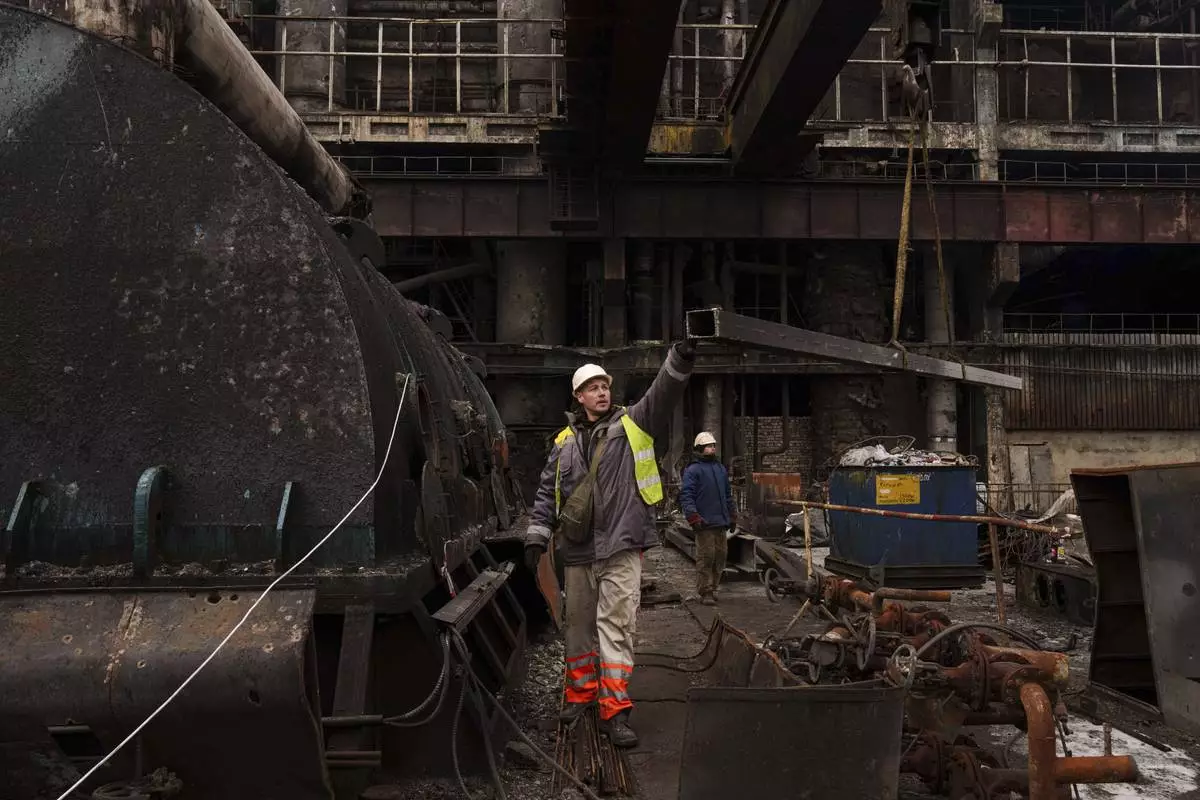
A worker lowers a metal bar to the ground using a crane during repairs to DTEK's power plant after a recent Russian missile attack in Ukraine, Nov. 28, 2024. (AP Photo/Evgeniy Maloletka)
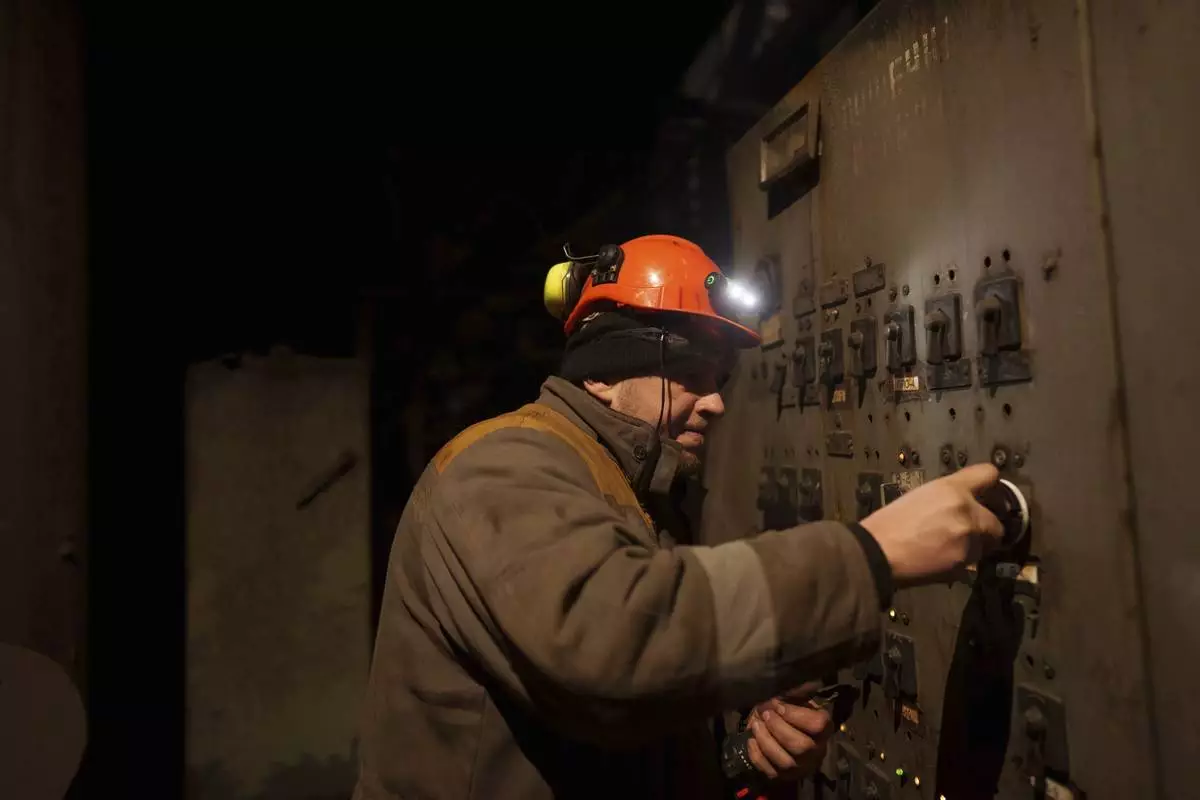
A worker repairs equipment at DTEK's power plant after a recent Russian missile attack in Ukraine, Nov. 28, 2024. (AP Photo/Evgeniy Maloletka)
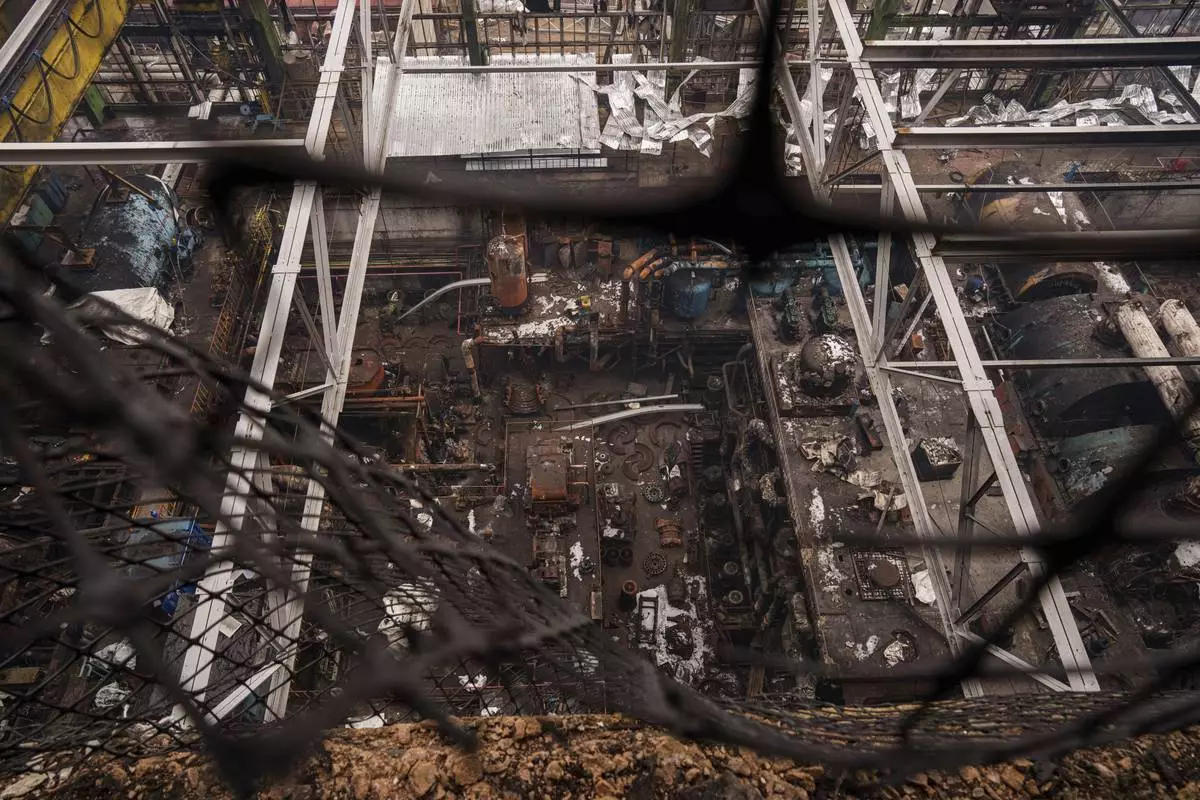
Production hall is seen destroyed though the roof after a recent Russian missile attack at DTEK's power plant in Ukraine, Nov. 28, 2024. (AP Photo/Evgeniy Maloletka)
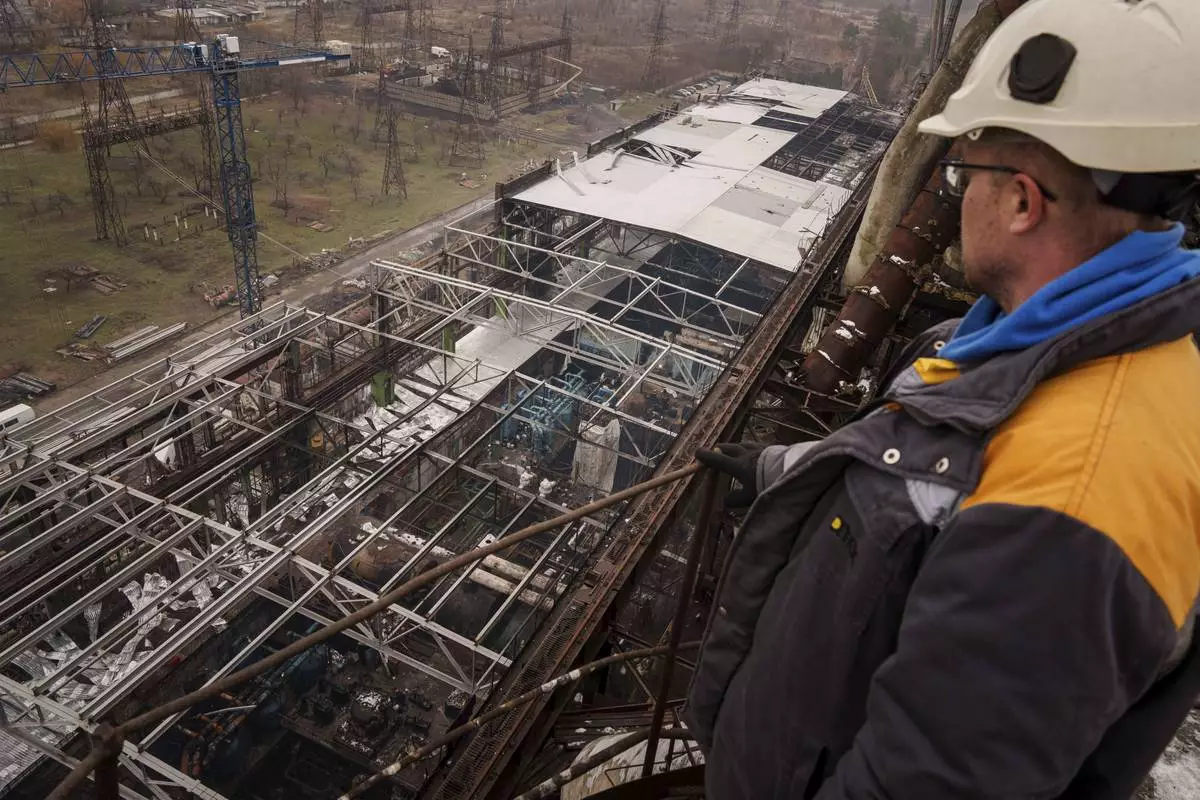
A worker looks on a production hall after a recent Russian missile attack at DTEK's power plant in Ukraine, Nov. 28, 2024. (AP Photo/Evgeniy Maloletka)
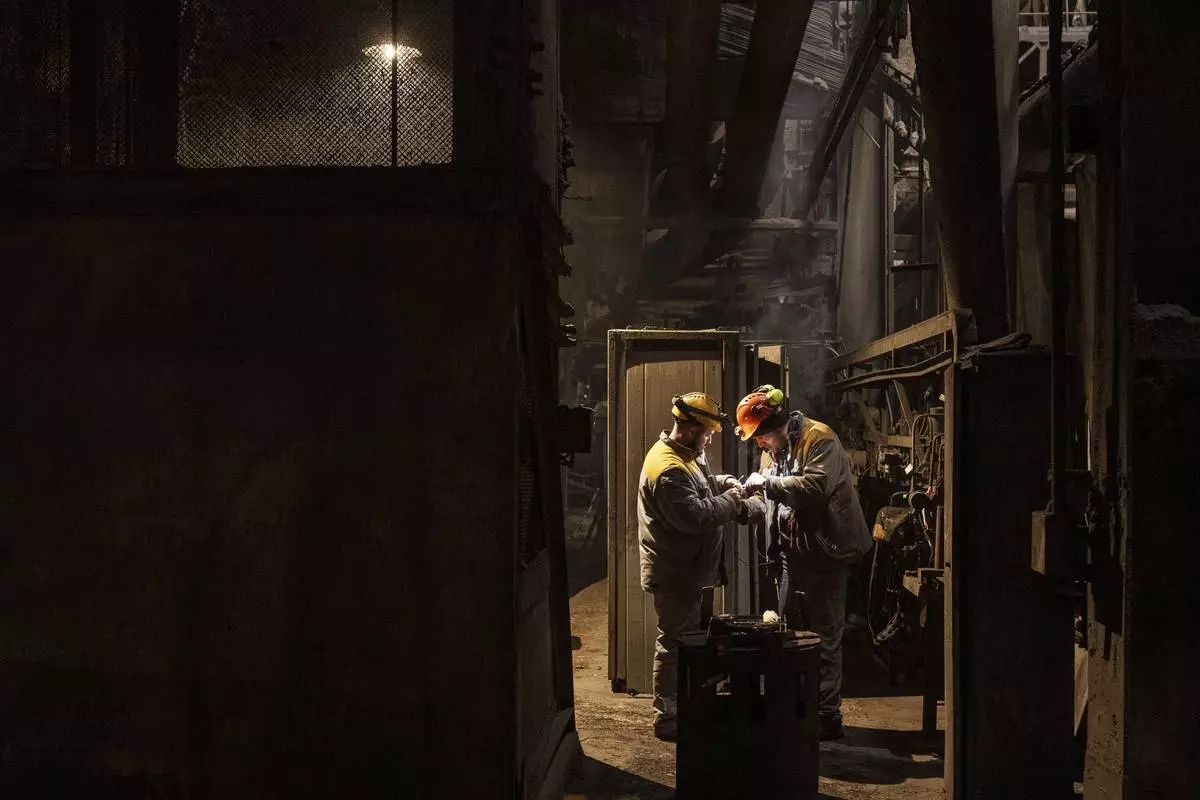
Worker repair equipment at DTEK's power plant after a recent Russian missile attack in Ukraine, Nov. 28, 2024. (AP Photo/Evgeniy Maloletka)
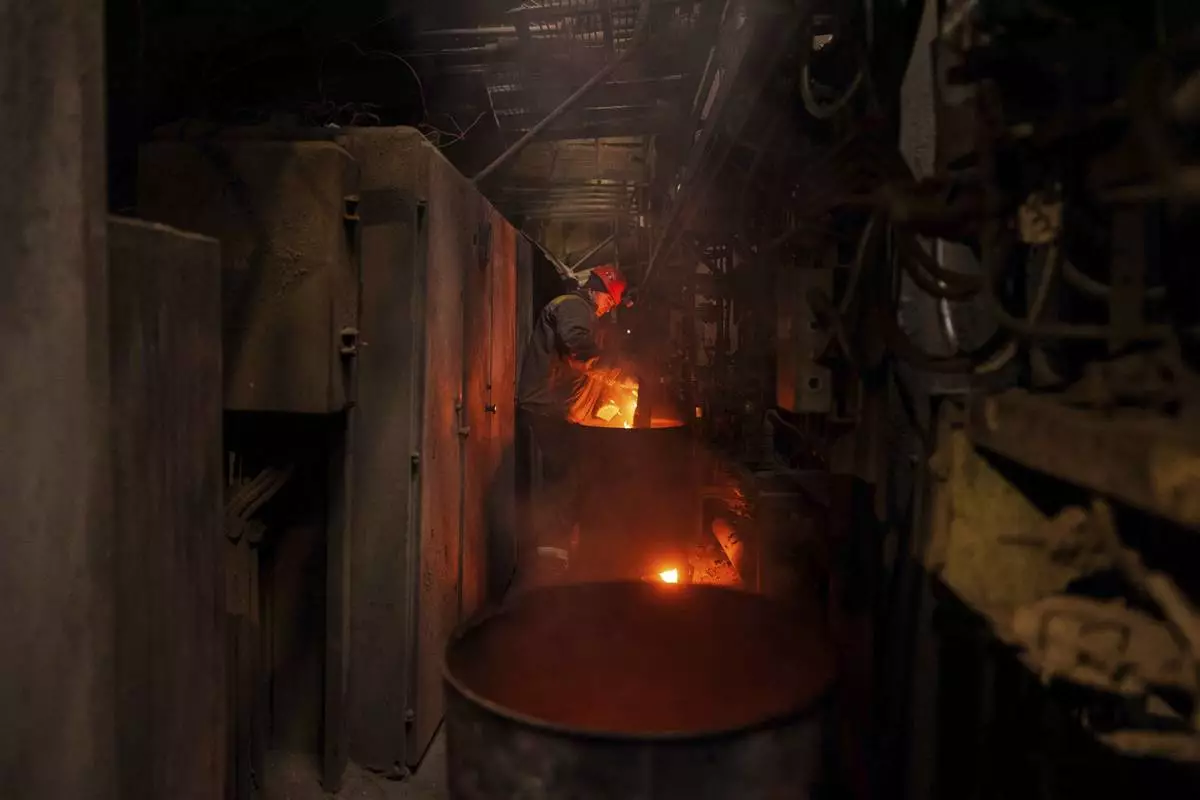
A worker throws firewood into a stove to heat pipes at DTEK's power plant after a recent Russian missile attack in Ukraine, Nov. 28, 2024. (AP Photo/Evgeniy Maloletka)

A worker speaks by mobile phone inside operating room at DTEK's power plant after a recent Russian missile attack in Ukraine, Nov. 28, 2024. (AP Photo/Evgeniy Maloletka)
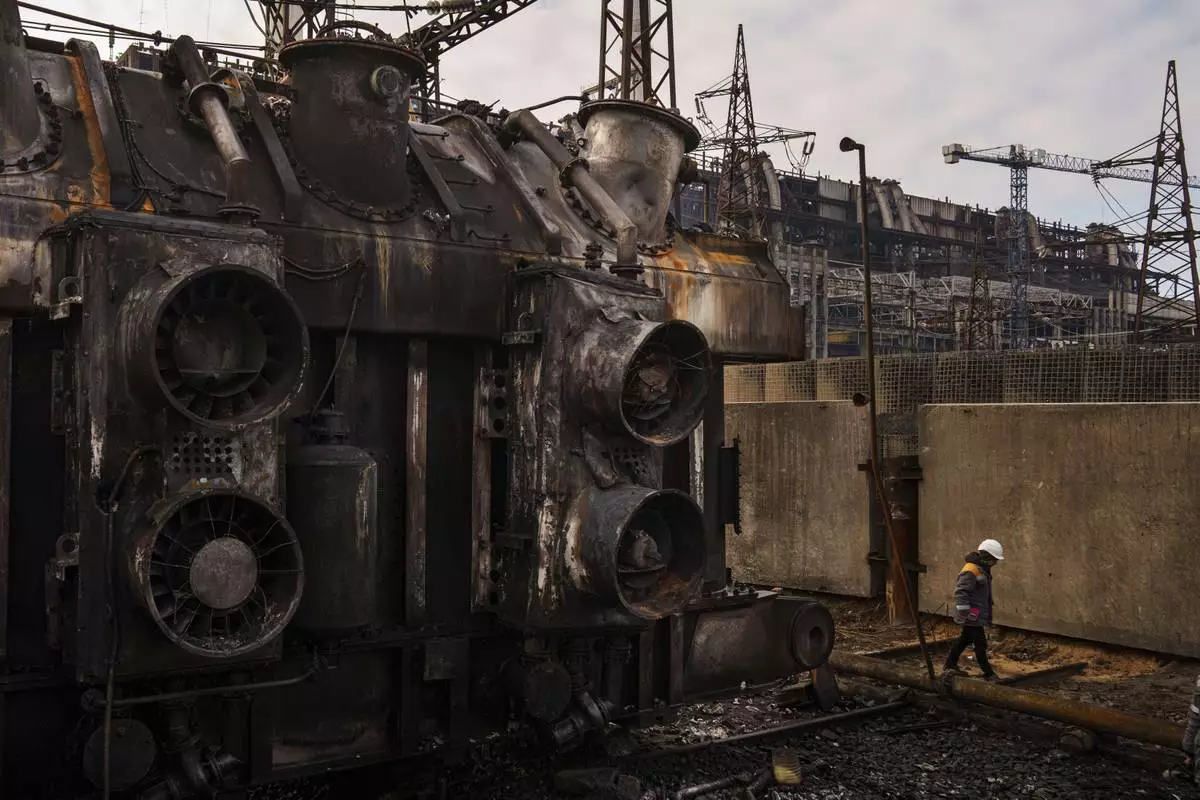
A worker walks in front of a transformer which was destroyed after a recent Russian missile attack at DTEK's power plant in Ukraine, Nov. 28, 2024. (AP Photo/Evgeniy Maloletka)




